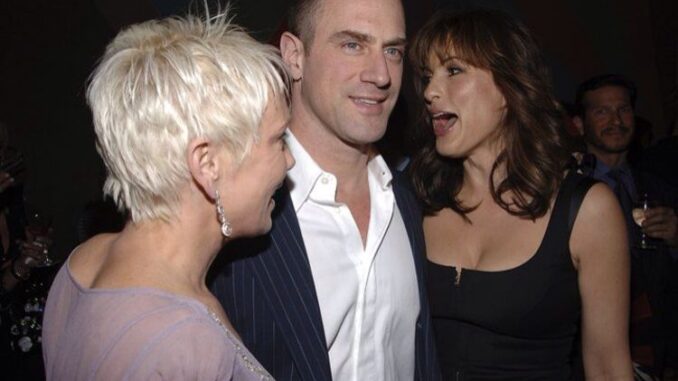
The Audacity of Desire: When René Rapp Wants to Date Olivia Benson
In the ever-churning kaleidoscope of modern celebrity and digital culture, some pronouncements land with the weight of a meteor, others with the gentle whisper of a passing breeze. And then there are those, like René Rapp’s candid desire to play Olivia Benson’s love interest, that unfurl like a perfectly tossed grenade: instantly captivating, slightly audacious, and utterly reflective of a specific cultural moment. It’s more than a quip; it’s an illustrative nexus where Gen Z authenticity, fan yearning, and the evolving landscape of queer representation collide with a beloved, long-standing icon.
To understand the resonance of Rapp’s statement, one must first appreciate the two titans involved. René Rapp, a burgeoning queer icon, is the embodiment of Gen Z cool: unflappably confident, musically gifted, brutally honest, and possessing an internet-savvy wit that cuts through the manufactured sheen of traditional celebrity. From her breakout roles in Mean Girls the musical to The Sex Lives of College Girls and her burgeoning music career, Rapp projects an image of effortless self-possession and an unapologetic embrace of her identity. She speaks the internet’s lingua franca, understands the power of a meme, and wields her platform with a refreshing lack of filter.
Then there is Olivia Benson, the unyielding monolith of justice from Law & Order: SVU. Portrayed by Mariska Hargitay for over two decades, Benson is more than just a police captain; she’s a secular saint, a maternal figure, and a beacon of unwavering integrity in a world perpetually teetering on the edge of darkness. She’s faced every imaginable trauma, emerged scarred but resolute, and earned a singular place in the pop-cultural pantheon. For many, especially on the internet, Benson has transcended mere character to become the internet’s collective “mommy”—a figure of comfort, protection, and fierce, unwavering moral authority. Her gravitas is undeniable, her legend cemented.
When Rapp, with her characteristic swagger, declares her wish to be Benson’s love interest, it’s a collision of universes. It’s the brash, queer, digital-native energy of the present crashing into the stoic, established, almost sacred tradition of network television. The immediate reaction is a blend of delighted shock and fervent agreement from a specific corner of the internet. This isn’t merely a joke; it’s an articulation of a deep-seated fan desire, a wish fulfillment that has simmered in the fertile grounds of fanfiction and online forums for years. The idea of Olivia Benson, a character often portrayed as sacrificing personal happiness for professional duty, finally finding love, and queer love at that, is a potent fantasy.
Rapp’s statement illustrates several key facets of contemporary culture. Firstly, it highlights the blurring lines between celebrity and fan. Rapp isn’t just an actress; she’s an active participant in online discourse, someone who understands and speaks to the desires of her audience because she often shares them. Her desire is presented not as a demand, but as a relatable fantasy, making her even more endearing and authentic to her fanbase. It shatters the comfortable pane of the fourth wall, inviting the audience into a shared, playful imagining.
Secondly, it underscores the growing, undeniable demand for diverse and meaningful queer representation. For too long, LGBTQ+ characters were relegated to the sidelines, their storylines often tragic or tokenizing. Rapp’s desire for a high-profile, queer romance with a universally beloved character like Benson is a testament to how far conversations around representation have come. It’s a bold assertion that queer love stories deserve to be central, iconic, and just as compelling as their heterosexual counterparts. It’s a playful yet powerful declaration that queer narratives aren’t niche; they’re mainstream, and they resonate deeply with a broad audience.
Finally, Rapp’s comment illustrates the sheer power of internet culture to shape and influence narratives. While the likelihood of SVU suddenly pivoting to a queer romance for its lead character might seem slim, the very act of voicing such a desire, and its subsequent virality, opens up conversations and plants seeds. It’s a testament to how fans, through the conduits of social media and the voices of their beloved celebrities, can articulate collective wishes that subtly, or not so subtly, push the boundaries of established media. It signals to creators what audiences crave, what stories feel fresh and relevant.
René Rapp wanting to be Olivia Benson’s love interest is far more than an idle celebrity musing. It’s a perfectly calibrated pop-culture tremor that encapsulates the audacious spirit of a new generation, the enduring appeal of a television legend, and the hungry heart of a fanbase yearning for more inclusive, imaginative stories. It’s a testament to the power of a simple statement to illuminate complex desires, proving that sometimes, the most profound cultural insights come wrapped in the most delightfully unexpected packages.
